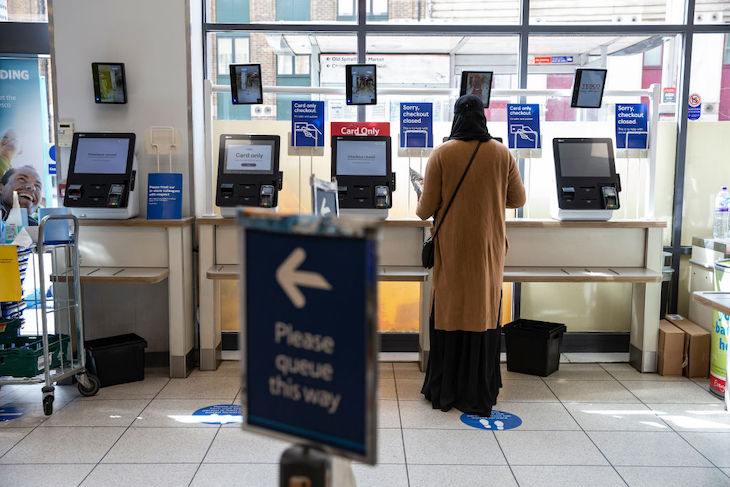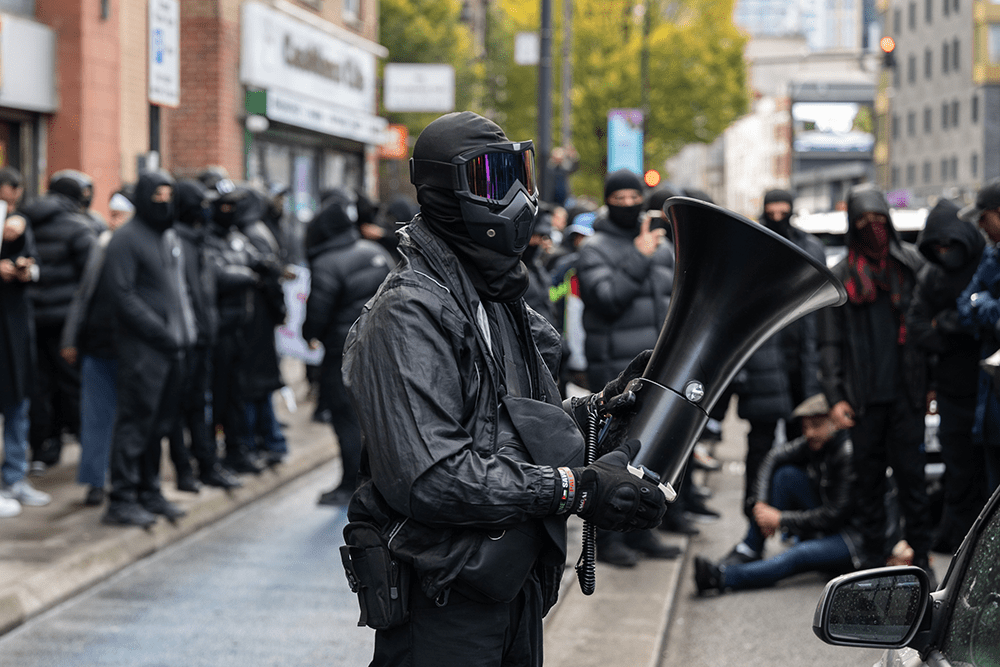Tesco has followed Sainsbury’s lead by installing cameras above self-checkouts to identify when shoppers fail to scan an item properly, using the footage to provide a live-action replay of their misdeed. Predictably, it’s not gone down well: a video posted on Instagram involving a can of tuna got more than 3.5 million views. When will the supermarkets learn to stop treating their shoppers like criminals?
Tesco’s track record with customer data is not encouraging
Much of the reaction to Tesco’s VAR (Video Assistant Referee) cameras has focused on Britons’ humorous responses: ‘VAR Decision – Tuna Disallowed,’ joked one person. ‘Clearly off side,’ riffed another. But the growing surveillance in our supermarkets is no laughing matter.
Everyone needs to buy food and, with a 28 per cent share of the UK supermarket sector, Tesco is the UK’s biggest grocery chain. Shoppers who don’t want to be spied on are running out of options.
One customer, noticing the new systems in his local store in south-east London, has taken the matter seriously. Gaming developer John O’Reilly wonders how anyone can consent to ‘such deeply invasive technology. ‘Are children even kept out of the dataset?’ he asks. ‘Who can access this data? Is it shared with police? Is my data being sold?’ We need answers to these questions!’
Tesco’s track record with customer data is not encouraging. Amid repeated claims that its Clubcard loyalty scheme is not clear or fair in its pricing, the chain has earned itself huge revenues by selling customers’ (albeit unidentifiable) data. For its part, Tesco has said: ‘We do not sell or share any individual customer data and we take our responsibilities regarding the use of customer data extremely seriously.’
But the use of VAR and facial recognition technology in supermarkets ups the stakes considerably. This is not just anonymised data about preferences and shopping habits ‘for marketing purposes’. The biometrics involved feed a little-understood and potentially vast system with intimate information about individuals, from their physical characteristics to emotion-based behaviour.
The purpose of such technology is to identify people; hence the attraction for retailers wanting to combat rising theft. Asda is the first UK-wide supermarket to trial live facial recognition in five of its stores (the Southern Co-op have been using it for a while). Staff are able to add individuals to a watchlist, marking them as a ‘person of interest’. But rather worryingly, shoppers aren’t necessarily informed if their biometric data is being stored. The civil liberties group Big Brother Watch has filed a legal complaint about Asda with the Information Commissioner, arguing that its use of live facial recognition cameras is ‘unlawful’.
The concrete risks – there are plenty of examples of misidentification in this early use of a new technology – are real. But the greater danger can’t be resolved by its users tweaking the tech to make fewer mistakes.
Big Brother Watch director Silkie Carlo captures what we should have learnt from the mass surveillance regimes of other times and places: ‘When mundane aspects of everyday life like food shopping become opportunities for the powerful to cast a biometric surveillance net over the public we lose more everyday freedom. It’s not just the political impact – but psychological.’
Most people have an instinctual sense of the harms of going about their daily business under surveillance. But as we rush into the age of AI, many are allowing that sense to be overridden by the twin elements of a narrative suggesting our feelings are unimportant and that it is pointless to protest. These, the concepts of ‘convenience’ and ‘inevitability’ so elegantly unpacked by Brett Scott in his book about digital payments Cloudmoney, also apply to surveillance. While they come from the organisations set to benefit from the changes, the messages appeal to people’s desire for an easy life. So many supermarket customers console themselves with the idea that ‘cameras are everywhere’ or ‘they already have our data’.
Naturally, Tesco has made much of the narrative of convenience. ‘We have recently installed a new system at some stores which helps customers using self-service checkouts identify if an item has not been scanned properly, making the checkout process quicker and easier,’ a Tesco spokesperson said following the unveiling of its VAR checkout tills.
Note how the phrasing cloaks the imposition in positive terms, presenting something self-evidently unpalatable as ‘helpful’. It’s a misleading use of language that has somehow slipped into public discourse in recent years: Tony Blair uses it when he argues that digital ID will make accessing public services ‘easier’. Councils use it when claiming that roadblocks will ‘encourage’ drivers to walk or cycle. But we don’t have to fall for it. As consumers, we can decide where to take our custom.
Since returning to the UK after a couple of years abroad to find supermarkets becoming distinctly dystopian, I’ve changed my shopping habits radically. Tesco, which has been the subject of criticism for its treatment of farmers and suppliers since the early 2000s, was an easy shop to drop. Sainsbury’s, the supermarket of my childhood, was less easy to give up. But my local Sainsbury’s and the Co-op in the market town where I used to live have become unrecognisable. Once charming, they are now silent places where grim-looking staff oversee customers operating machines under banks of screens.
I can’t ignore how Britain’s supermarkets are becoming something entirely different from places where people buy their groceries. As well as being uncomfortable shops to visit, they’re eroding our long-established, hard won right to privacy. And, unlike John O’Reilly, our politicians aren’t asking the necessary questions about how our personal data will be used or considering policies to protect us.
So it seems that it’s down to us, the supermarket customers, to look out for ourselves. That’s why I’m amazed when I see endless posts online by people complaining about the automation and surveillance in the stores they continue to patronise. It’s time to recognise that an arrangement in which we’re expected to exchange our biometrics as well as our money for food is a Faustian pact that won’t end well. Tesco’s VAR cameras are the final straw for me; they should be for you too.







Comments